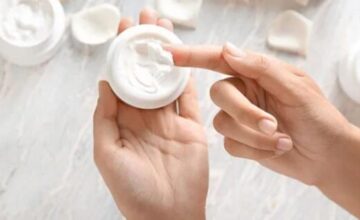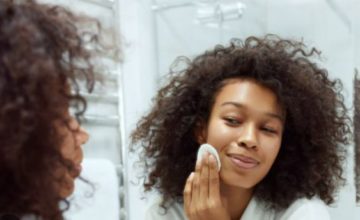
Oily skin is a skin type characterised by excessive sebum secretion.
This skin type has a tendency of getting easily clogged up as a result of this excessive sebum.
The sebaceous glands make the t-zone and its adjacent area appear shiny. Whiteheads and blackheads are some of the common concerns
for oily skin.
Due to the oily nature of the skin, acne and its after effects are major concerns for this skin type.
You have little control over how much oil your skin naturally produces, as this is largely determined by genetics, stress, diet and hormonal fluctuations within the body, but here’s an ultimate guide to help you fight your oily skin.
1. Cleansing
Wash your face every morning, evening, and after exercise. Use gentle, non alcoholic, oil free, foaming face wash. Look For ingredients like salicylic acid, glycolic acid, benzoyl peroxide or niacinamide etc While washing, resist the temptation to scrub your skin, even to remove makeup. Scrubbing irritates your skin, which can make it look worse and trigger increased oil production.
2. Moisturise
Although you have oily skin, it is still important to apply moisturiser to keep your skin hydrated. Choose moisturiser that are labeled “oil free” and “noncomedogenic”.
3. Protect
Wear sunscreen everyday both indoors and outdoors. Sunscreen fights sun damage that could lead to wrinkles, age spots and even skin cancer. To prevent acne breakouts, look for sunscreens that contain zinc oxide and titanium dioxide, and do not use sunscreens that contain fragrance or oils.
4. Avoid heavy makeup
Use oil free, water based or gel-based makeup products. DON’T sleep in your makeup. Always remove all makeup before going to sleep.
5. Do not pick at your skin
Although it’s tempting to touch your face, doing so can spread dirt, oil and bacteria from your hands to your face and further causing acne.
6. Haircare
Wash hair regularly, as you might have oily scalp too leading to dirt and residue build-up causing acne.
7. Change pillowcase every day
We sleep on pillows for almost 1/3 of a day, sleeping night after night on the same pillowcase creates an environment where more and more skin oil and bacteria collects on the pillow. Therefore, it’s a smart move to swap out your pillowcase every day.
8. Eat right and stay hydrated
Consuming 2-2.5 litres of water everyday helps in flushing out toxins and also helps in better absorption of nutrients. A balanced diet is always a key to maintain healthy skin and hair.
Every person’s skin is different, and there is no ‘one size fits all’ approach to skincare. If you are concerned about the amount of oil your skin is producing or if you’re struggling with blackheads or acne, make an appointment to see a board-certified dermatologist.




